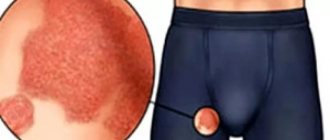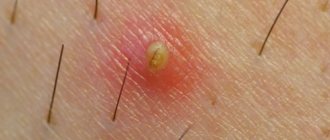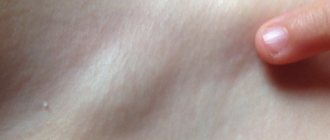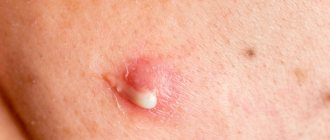Normally, a woman’s vaginal discharge should be transparent or whitish, have a uniform consistency and a sour smell. Such mucus is necessary to cleanse the vagina of waste products, and its absence is in itself a deviation. But if a woman experiences strange discharge, itching and dryness in the intimate area, do not hesitate to visit a doctor. The problem can be caused by non-dangerous reasons (climate change, stress, changes in the quality of water or food), or serious pathological processes in the body.
Causes of irritation in the bikini area
- External factors
Irritation in the bikini area is often caused by mechanical damage to the skin. After shaving the intimate area, redness, pimples, and itching often appear - the skin becomes especially inflamed in the summer, when sweating increases. When depilating with a razor, the top layer of skin is damaged, which can lead to dryness and flaking, and growing short hairs cause itching and, accordingly, redness and scratches on the skin.
Expert opinion
Depilation using wax, sugar paste and tweezers damages the top layer of skin to a lesser extent, but more often provokes ingrown hairs. As a result, painful pimples form in the bikini area, the opening of which is fraught with the penetration of pathogenic agents into the deeper layers of the skin (especially in the hot season).
Obstetrician-gynecologist of the highest category Oksana Anatolyevna Gartleb
Violation of the temperature regime that is comfortable for the skin - too high or, conversely, low temperature - can also cause discomfort in the vagina. Of course, external contamination of delicate areas may not be the last cause of irritation.
In addition, discomfort may occur from inappropriate intimate cosmetics. For example, hypoallergenic baby soap, which many women still use as an intimate care product, greatly dries out the delicate skin of the vagina, since the production of sebum by baby skin and the delicate skin of the intimate area occurs in different volumes. It is important to use special products for intimate hygiene - for example, GINOCOMFORT Soothing washing gel consists of natural ingredients that not only delicately cleanse the vaginal mucosa and skin of the labia, but also regulate the acid-base balance that is comfortable for this area.
- Microflora disturbance
One of the most common causes of severe irritation in the intimate area is diseases associated with disruption of the natural bacterial and acid-base balance: thrush (candidiasis), bacterial vaginosis (dysbacteriosis).
These diseases can be caused by a general decrease in immunity, poor diet, sleep, hygiene, frequent stress, taking antibiotics, promiscuity, etc.
Characteristic symptoms include severe irritation in the intimate area after sex, thick atypical discharge with a pronounced unpleasant odor, severe itching and burning. Any of these diseases is treated with special regimens using antibacterial drugs, pro and prebiotics. Self-medication can cause irreversible complications or make the process critical, so it is better to contact an obstetrician-gynecologist to clarify the diagnosis and develop treatment tactics.
- Allergic reactions
Often, intimate itching can occur with contact dermatitis - a manifestation of allergies in a delicate area. One of the most common reasons is scented hygiene products. Fragrance in pads, tampons, and toilet paper is a strong allergen and can cause itching. If you experience irritation in your intimate area, especially during menstruation, try changing your pads - this may solve your problem. In some cases, allergies can be caused by contraception (latex condoms) and lubricants. Most condoms are made from latex.
- Hormonal background
Irritation in the intimate area in women often occurs before hormonal changes: menstruation, pregnancy. Many women are familiar with the sensation of dryness, burning, and severe itching. Irritation in the perineum can be an external sign of hormonal disorders such as hypo- or hyperfunction of the thyroid gland, ovaries, and adrenal glands. To establish an accurate diagnosis, a consultation with an obstetrician-gynecologist and tests for hormone levels are necessary.
Expert opinion
Changes in hormonal levels and the resulting irritation in the intimate area can be triggered by taking oral contraceptives. This situation is especially common if a woman takes OCs, chosen independently or on the advice of a friend, without consulting a gynecologist.
Obstetrician-gynecologist of the highest category Oksana Anatolyevna Gartleb
- Poor intimate hygiene
It is obvious that irregular showering, especially during menstruation, hot weather or after visiting the gym, leads to an increased proliferation of harmful bacteria and fungi, causing rashes and itching in the intimate area in women. Wearing synthetic underwear also has a negative effect - panties made of artificial fabrics do not allow air to pass through, creating a greenhouse effect - an ideal environment for the proliferation of pathogenic microbes. It is important to know that thongs, thongs and similar models are a “bridge” for bacteria from the anus, so if discomfort occurs, it is better to refrain from wearing them.
- Diseases of internal organs
Endocrinologists warn: severe itching and dryness in the genital area is one of the indirect signs of diabetes. Sometimes irritation in the intimate area can indicate anemia, leukemia, immunodeficiency conditions, inflammation in the urinary system, gastrointestinal tract, and cancer. Redness, spots and rashes on the external genitalia occur with eczema (eczematis) and psoriasis (psoriasis).
Of course, you can’t rely only on vaginal itching to make an accurate diagnosis, but this unpleasant symptom can indicate serious health problems, so it’s better not to delay visiting a specialist.
- Sexual infections
Itching, burning and unpleasant discharge after sexual intercourse (especially unprotected with a new man) are accompanying sexually transmitted diseases. They are especially characteristic of gonorrhea (Gonorrhoea), chlamydia and trichomoniasis (trichomoniasis). In addition to discomfort in the intimate area, sharp pain during urination, pain during sexual intercourse and foul-smelling discharge may be added - if these signs appear, you should urgently get tested and visit an obstetrician-gynecologist. Most sexually transmitted infections in the early stages can be quickly and successfully treated, so timely consultation with a doctor can save you from unpleasant consequences and complications.
- Stress
The female genital organs are very susceptible to psychological conditions: emotional instability, stress and frequent anxiety can cause itching in intimate places.
It is important to monitor your stress levels whenever possible and use sedative therapy if necessary to improve your quality of life.
The causes of irritation in intimate areas are varied and may depend on completely different factors. If you feel that self-treatment does not lead to an improvement in the situation, do not hesitate to visit an obstetrician-gynecologist, this way you will quickly determine the cause of the discomfort and get rid of it.
The causes of irritation in intimate areas are varied and may depend on completely different factors. If you feel that home treatment does not lead to an improvement in the situation, do not hesitate to visit a gynecologist, this way you will quickly determine the cause of the discomfort and get rid of it.
Diagnostics
If a burning sensation appears in the vagina after sexual intercourse, it is advisable to consult a gynecologist as soon as possible. Diagnostic measures will primarily be aimed at identifying the causative agent of the suspected infection:
- During a gynecological examination of the external and internal genital organs, the doctor may see manifestations of the inflammatory process of the vulva, vagina, or suspect the presence of dysbiosis of the natural vaginal flora.
- An important point during the examination is the patient’s subjective feeling of pain if the vaginal mucosa is involved in the pathological process;
- During the examination, a smear is taken from the vagina and cervix for microflora for bacterial and microscopic examination;
- Other research methods may be prescribed to determine pathogenic microorganisms - ELISA, PCR;
Rules of conduct before visiting a gynecologist:
- a couple of days before visiting a doctor, you should not use any suppositories or sprays, antibacterial agents, have sexual intercourse, or douche;
- do not urinate a couple of hours before going to the doctor;
- On the evening before the visit, you need to wash your external genitalia with warm water and regular (not antibacterial!) soap.
If a woman associates the appearance of a burning sensation in the vagina with the use of lubricants, condoms or contraceptives, then she should consult an allergist. If the infectious nature of the disease cannot be confirmed and the level of female sex hormones is within normal limits, then a consultation with a psychotherapist may be necessary to diagnose problems in the psycho-emotional sphere.
How to get rid of skin irritation in the intimate area?
Of course, only an obstetrician-gynecologist can determine the exact treatment regimen depending on the cause of discomfort. We will tell you about the main methods of relieving itching and burning in intimate areas. In cases associated with diseases of the reproductive organs and other internal diseases, when discomfort in the vagina is a concomitant symptom, complex drug therapy is used to eliminate the underlying cause. It is prescribed individually depending on the underlying disease. In case of endocrine disorders, treatment is carried out using systemic and local hormonal drugs.
Burning and itching due to disturbances in the acid-base balance and microflora are removed with antibacterial or antiseptic drugs, pro and prebiotics, and lactic acid. Treatment often lasts only a few days.
If the discomfort is mild and does not require serious treatment, daily washing with infusions of calendula, arnica, chamomile and other medicinal plants with a calming and disinfecting effect can help.
In the process of eliminating unpleasant sensations in the vagina, it would not be superfluous to enhance the effect of drug treatment from the outside with the help of specialized intimate cosmetics. Soothing washing gel GINOCOMFORT normalizes microflora, gently cleanses the skin and gives a feeling of freshness throughout the day.
How to properly shave the intimate area for women? Source – Ksyu Myakonkaya – Beauty Ksu
What to do if your labia are peeling
The first thing to do is check for blistering rashes, plaque or bites. These manifestations indicate the pathological nature of peeling.
To exclude the disease, you need to consult a dermatovenerologist who treats both infectious and non-infectious skin lesions. Including peeling and itching in the groin area.
In addition, you can try treating peeling with homeopathic medicines, which successfully cope with many skin problems. Homeopaths rightly believe that all skin rashes, peeling and itching are just a signal that the functions of some organs and systems in the body are impaired. Homeopathic treatment is aimed at establishing these functions and balancing the interaction of all body systems.
Pimples and irritation after shaving in the intimate area in women: how to properly remove hair with a razor?
Hair removal in intimate areas is a recent trend. How to avoid irritation after depilation?
- Be sure to apply shaving cream or foam to your skin before depilation.
- If you are removing hair with a reusable machine, treat it with a disinfectant such as alcohol or chlorhexidine.
- Use only a very sharp razor; a dull razor can damage delicate skin.
- Do not press the razor too tightly against the skin or run over one area several times in a row.
- After depilation, treat the skin with a septic cream and do not wear underwear until it dries to allow the area to calm down and not cause irritation.
Cream or soap: how to properly care for the skin in intimate places?
- Use only special cosmetics for delicate intimate care. It contains natural ingredients, does not cause allergic reactions and is suitable for gentle cleansing of delicate areas. The composition of GINOCOMFORT washing gels corresponds to modern recommendations of gynecologists - GINOCOMFORT intimate cosmetics are not only suitable for daily care, but also help to maintain the cleanliness of the genitals during menstruation and during the treatment of gynecological diseases, when the body is especially vulnerable.
- If possible, wear comfortable underwear made from natural fabrics. If you want to wear erotic panties, be sure to take a shower before putting on such panties, and also change your underwear before going to bed - sleeping in thongs can increase the level of pathogenic bacteria in the vagina.
- Maintain personal hygiene: obstetricians-gynecologists recommend washing yourself 1-2 times a day, during menstruation up to 4 times a day, if possible, with each pad change.
Pads and tampons should be changed every 3-4 hours, regardless of the amount of discharge. - Pay attention to contraception: if you are allergic to latex, choose condoms made from other materials.
- Visit your obstetrician-gynecologist at least 2 times a year to rule out the development of diseases.
And remember: irritation in the intimate area, even if it just “itches” and there are no other more serious symptoms, is not the norm, and this condition is most often easy to eliminate.
There is no need to avoid the possibility of solving an unpleasant problem. The right cosmetics and treatment selected by an obstetrician-gynecologist will allow you to regain confidence in your beauty, comfort, feeling of freshness and good mood every day. Sources:
- Inflammatory diseases of the female genital organs. Modern perinatal technologies in strengthening the reproductive health of patients. Naumov I.A. // Monograph. Saarbrucken: LAP LAMBERT Academic Publishing GmbH end Co. KG. — 2011. — pp. 18–21.
- Microbiological characteristics of biotopes of the reproductive tract with endometritis. Glukhova E.V., Shakhovskaya I.N. // Togliatti honey. consultation – 2008. – 1 (2): pp. 38–44.
- Medical and social characteristics and forecasting of reproductive health of young women at the present stage. Torubarov S.F. // Social aspects of public health. – 2013. – 5 (33): P. 7.
- https://ciplamed.com/content/important-tips-to-maintain-intimate-hygiene
- https://www.lactacyd.eu/your-intimate-zone/
- https://www.medicalnewstoday.com/articles/321537.php
Diseases and pathologies of internal organs
Very often, itching and burning after sexual intercourse is caused by a fungus. This disease is called candidiasis or thrush. It manifests itself not only as unpleasant sensations, but also as cheesy white discharge, as well as enlargement of the labia and pain during urination.
It should be noted that the fungus is often transmitted to a sexual partner during sex. Therefore, doctors recommend giving up love relationships until candidiasis is completely cured.
When the uterus or its appendages, which include the tubes and ovaries, become inflamed, the volume of vaginal discharge increases. As a result, its pathology develops. Abnormal discharge irritates the mucous membrane, which causes burning or itching during or after sexual intercourse.
Also, unpleasant sensations can arise due to the occurrence of a disease such as trichomoniasis. This is an infectious disease of the human genitourinary system, the causative agent of which is Trichomonas vaginalis.
Popular questions
Irritation on the pubic area under the hair.
What to do? You need to understand what caused this: an allergic reaction, a bacterial, fungal or viral infection, or an injury during depilation. For this, a consultation with an obstetrician-gynecologist, and in some cases a dermatologist, is required. Only then will it be possible to recommend suitable treatment.
Severe itching on the labia, irritation. There is nothing to worry about in the vagina itself. What could it be?
This may result in an allergic reaction or inflammation. I recommend using Ginocomfort gel with mallow extract, applying it once a day to the discomfort zone for 7 days. If you do not notice relief, consult a doctor.
I am 69 years old. I am concerned about vaginal irritation and dryness. I was treated once with Triozhinal suppositories. The result was positive for 1.5 years. Now this problem has arisen again. But now these candles cause a strong burning sensation. Today I am flying to the sea, and I am afraid that I will not be able to swim, since the salt water is making the problem worse. Please advise what I can do. Thank you! Hello! During the postmenopausal period, inflammatory processes develop in the genital tract against the background of atrophic changes in the mucosa caused by hormone deficiency. Its layers become thinner, elasticity decreases, and the number of lactobacilli decreases. In this situation, a study is required: a smear for flora, oncocytology. The first step is to prescribe drugs with anti-inflammatory activity, and the second step is to moisturize, restore microflora, and, in the absence of contraindications, local hormone-containing suppositories. A feature of treatment in this age group is continuous maintenance therapy. At this stage, before receiving the results of the study, you can use Ginocomfort gel with mallow extract, which will have anti-inflammatory and moisturizing effects. The gel is applied in 1 dose 1 time per day for 10-14 days.
Hello! Is it possible to feel a burning sensation and irritation when using Gynocomfort?
Hello!
A slight tingling sensation may be felt immediately after administration, but will quickly subside on its own. If this happens, then you should continue to use the gel. For an accurate diagnosis, contact a specialist
Folk remedies
While you determine the cause, folk remedies will help relieve itching and irritation of the genitals. Folk remedies can be as effective as medications. Here are some home remedies you can try to relieve discomfort caused by irritation and itching of your private parts.
Add two tablespoons of natural apple cider vinegar to a glass of warm water. Wash yourself with this water twice a day for two or three days. Apple cider vinegar makes the vaginal microflora acidic, in which bacteria and fungi cannot grow.
Vaginal itching can be especially problematic at night, disrupting sleep, causing lethargy and fatigue in the morning. Use ice cubes or a cold compress to prevent itching at night. Salt can also be a good remedy to relieve itching and irritation of the genitals.
Garlic also has strong antibacterial properties that can relieve itching symptoms very quickly. Whatever the cause of genital itching, garlic can be used to relieve it. Grind in a blender or grate two or three cloves of garlic. Tie the grated garlic in gauze or a bandage and insert it into the vagina. The smell may not be very pleasant, but the effect is worth it.
Probiotics inhibit the growth of harmful bacteria in the body and their use to combat such bacteria is nothing new. Natural yogurt contains bacteria that can inhibit the growth of bad bacteria and stimulate the growth of beneficial bacteria. To treat vaginal itching, drink a glass of natural yogurt daily.
We suggest you familiarize yourself with Proper nutrition and diet after appendicitis: what you can eat after surgery and daily menu for adults and children
Yogurt can be used directly on the vaginal area. For this purpose, you can use tampons soaked in natural yogurt. The tampon is inserted into the vagina for several hours.
Antibacterial herbal talc or homeopathic talc is very gentle but takes longer to cure. Apply talcum powder to the labia to kill and prevent bacterial growth. In addition, talc can be applied to areas that sweat the most.
Rosemary decoction can be used for washing. Brew rosemary and let steep for 15 minutes. Cool to a comfortable temperature and use for washing.










